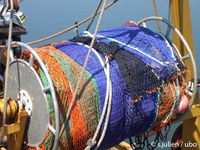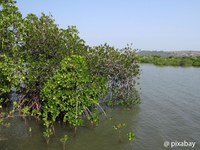1.2.3.3 Marine provisioning services

Provisioning services are defined as those that result in products obtained from ecosystems (in some cases referred to as production services). These include [MEA, 2005; Beaumont et al., 2007; Naber et al., 2008; Liquete et al., 2013 ].
].
 Food provision
Food provision
Marine ecosystems provide ample provisioning services including fish from marine and capture fisheries, marine products, and aquaculture products (farming of aquatic organisms, including fish, crustaceans, mollusks, seaweeds and algae). Both total and per capita fish consumption have grown over the past four decades leading to over fishing and over exploitation of marine fishery resources, which in turn reflected in increases in real prices of fish products. Shrimp farming often results in severe damage to mangrove ecosystems, although some countries have taken steps to reduce these harmful impacts.
While traditional aquaculture is generally sustainable, an increasing share of aquaculture uses carnivorous species, and this puts increased pressure on other fisheries to provide fishmeal as feed and also exacerbates waste problems.
Water storage and provision
The provision of water for human consumption and for other uses. Water abstraction in marine and coastal environments is mostly associated to coastal lakes, deltaic aquifers or desalination plants. Marine water may also be used for industrial cooling processes or coastal aquaculture in ponds and raceways.
Biotic materials
The provision of biomass or biotic elements for non-food purposes. This includes medicinal (e.g. drugs, cosmetics), ornamental (e.g. corals, shells) and other commercial or industrial resources (e.g. whale oil, fishmeal, seal leather, algal or plant fertilizers).
 Fiber, timbres, and fuel
Fiber, timbres, and fuel
Even though marine ecosystems are not usually associated with fiber, timbres and fuel, nevertheless the marine environment offers biomass used to produce energy can have a solid form (like wood from mangroves), liquid (like fuels extracted from algal lipids or whale oil) or biogas (from decomposing material). For example, coastal communities rely on mangroves for mangroves for building, manufacturing, fuel, and other needs.

